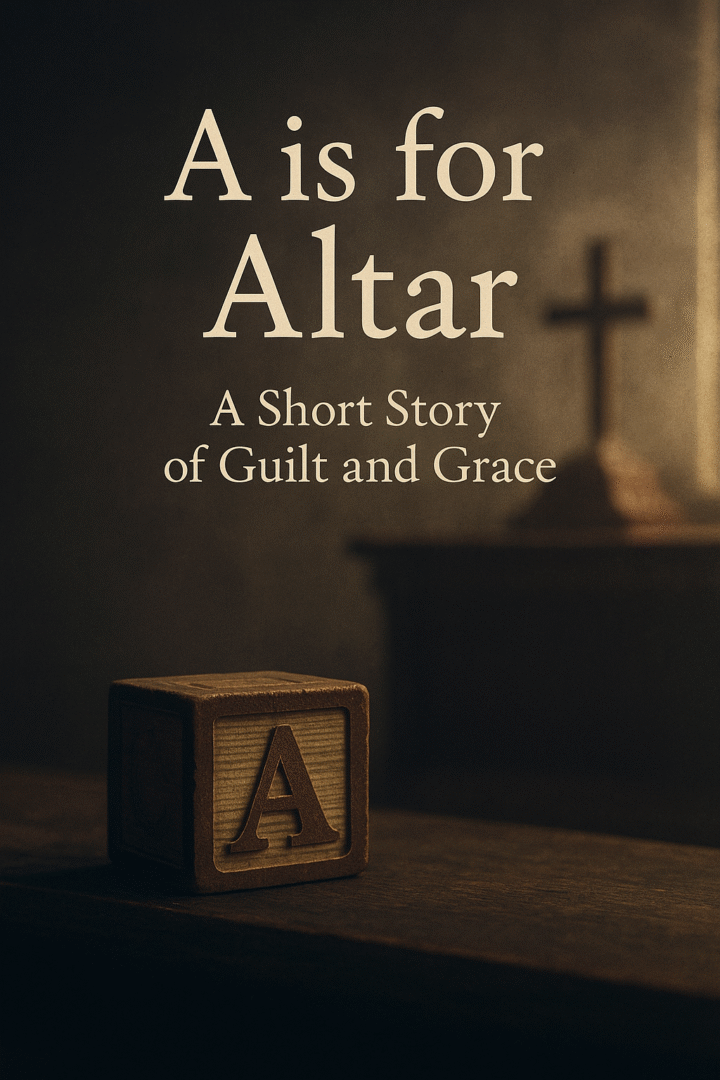
This short story, A is for Altar, invites you into a deeply personal moment of guilt, memory, and the quiet hope for grace. Originally written for a creative writing class in 2015 and now updated for the blog, it stands as part of a larger reflection on healing and faith. If you resonate with themes of letting go and spiritual reckoning, you might also find comfort in this piece on faith and healing.
Take a moment—read slowly—and see what rises in the silence.
The tension is palpable in the car. You feel it deep within your soul but don’t know how to address it. Frequently, you look at me as I drive. Your eyes, questioning my motives and actions, are accusatory. You feel the accusation and say nothing. What could you say? First, they were there with us, and then they were not. You don’t know—and yet, you do. You wonder where they went. Why did they leave? What could you have done to prevent their disappearance? Why didn’t they take you?
Anger, disbelief, anguish, misery, and longing all engulf you, each emotion warring with the others, none winning. You could have made a different decision, but you chose not to. And now, here you are, riding in a car. But to where? Where could you possibly go to escape the pending troubles?
The mind is a curious thing. It processes thoughts quickly, jumping from place to place like a grasshopper on hot concrete, never landing long enough to absorb the heat. Jump; you should listen. Jump; they are right. Jump; they left me behind. Your mind cannot grasp the consequences of your actions. You glance at me again. Your face wonders: Where? Where can you go? You know the answer, but you refuse to accept it.
Greens blend into blues and browns as the scenery speeds past the window. You know the car is moving, but you feel motionless; only the outside is in motion. Blurry eyes stare unseeingly at the highline poles flashing by; each one represents an alternative choice. A steady rhythm beats in your head: too late, too late, it’s too late. Your hands unconsciously clench and unclench in your lap. Small beads of sweat dot your upper lip. You bite your lower lip until a dot of blood wells up and quivers with each breath you take.
The lessons never stopped. You remember them from your first memory—sitting in Mother’s lap, learning the alphabet.
A, B, C, D, E, F, G — Jesus died for you and me
H, I, J, K, L, M, N — Jesus died for sinful men, Amen!
O, P, Q, R, S, T, U — I believe God’s Word is true
V, W — God had promised you
X, Y, Z — A home eternally
Frontward and backward, it all revolved around the church.
Z, Y, X and W, V — God is watching over me
U, T, S, R, Q, P, O — Jesus loves me, this I know—that’s so!
N, M, L, K, J, I — I will meet Him in the sky
H, G, F, E — God had promised me
D, C, B, A — I’ll be with Him someday
You know why Mom and Dad disappeared. They’ve gone to be with Jesus on that ambiguous “someday,” just like the song says.
They left you here with me. You want to blame me, but you know you made your own choices. You didn’t have to follow me—but you did. Was it worth it? Did you enjoy the parties, the carousing, the drugs and alcohol? Each party flashes through your mind, pinpointing the moments that culminated in this journey. You remember the acrid taste of whiskey burning your throat; you see the haze of smoke as you blow it through your nostrils; and you feel the desire to be free—free from the rules you hated. Your actions, not mine. No, you may have followed me because I am your brother, but you made your own choices.
As we travel, the telephone poles give way to buildings, abandoned cars, crashed buses, and roaming people. Their confusion is evident in their aimless wandering, their lack of purpose. Normally, people eat, sleep, work, shop, and play—but not today. Today, they wander in pointless circles. You feel their despair, but you do nothing but watch as you pass.
The song replays itself in your head.
Jesus loves me, this I know— that’s so!
You see yourself jumping with the other children, hands raised in the air, shouting with joy. But now? Now it feels like Jesus loved everyone but you. He left you here with nowhere to go.
You glance at me again. You know where we’re going, and you know it’s useless. The Bible says so.
B is for Bible, the map to heaven.
L is for lamp, to light the path.
H is for heaven—but not for you. Not today.
R is for rapture.
S is for the second coming.
H is for hell. You are on the way.
Abruptly, you slam your fist into the dashboard, not registering the pain as it radiates up your arm. Greater pain is to come. Greater pain is here. Your heart aches. Your face, normally so expressive, is slack. Reality hits you. You are here. Here, where only trials and tribulations remain. You are here: hopeless, helpless, irreparable, and irredeemable.
Despite the hopelessness, you look down the road, waiting for a familiar landmark to appear on the skyline. In the past, the steeple caused you to rebel. Today, it offers a glimmer of redemption. The founding fathers said, “If you don’t make the rapture, go to the church. Get to an altar and pray like you’ve never prayed before. Maybe—maybe—God will still hear and answer.”
L is for love—the love of the Savior.
For God so loved the world that He gave His only begotten Son.
Love. Surely, love is not dead. You want to hope—but you know it’s fruitless.
F is for the fruits of the Spirit.
The Spirit is gone, and the fruits are dead.
There it is.
The steeple—normally a bright, welcoming beacon in the sky—is shrouded in gray mist against bright clouds. There may as well be a CLOSED sign beaming into the sky instead of the stark white steeple. You feel the car slow and stop, unable to go any further. You get out and start walking, placing one heavy foot in front of the other. There is no joy, no spring in your step, no quick smile as you pass the others on the street. The people are pressed around you—so many who didn’t make it—all heading to the church. You recognize some of their faces, but there is no conversation. Like you, each person is wrapped in their own thoughts.
As you near the church, there are so many people that you are unable to press forward. You have to reach the altar.
A is for altar—where you leave your troubles behind.
You begin pushing and shoving your way through the crowd.
T is for touch—Touch the hem of His garment and be healed.
You have to touch the hem of His garment.
The altar is where He is.
You have to make it.
Reaching out, you wrap your arms and body around the altar.
F is for forgiveness.
It is here at the altar.
The silence gives way to wailing and screaming.
“Father, forgive me.”
Somewhere, something shifts.
📌 Before You Go…
📖 This short story may leave you wrestling with guilt, exhaustion, or the heavy silence that follows loss. If it did…
🖋️ You might also connect with my poem Tired. Just Plain Tired. — not for comfort, but for company in the dark.
💬 If it speaks to you, share it. Someone else might need to feel less alone too.
🌐 If this short story stirred a familiar weight—the ache of roads not taken, the silent echo of what could have been—this Cornell Chronicle essay might see you in that moment: “Woulda, Coulda, Shoulda: The Haunting Regret of Failing Our Ideal Selves”. It doesn’t offer comfort or answers—just recognition that some burdens are quiet but not negligible.
📬 Follow Vicky’s View
Subscribe for fresh posts from the desk of Vicky — AI tools, storytelling, odd moments, grandkid wisdom, and whatever else stirs up trouble (or inspiration).

This one was interesting, although there were some things I had issues with. Its well written, but I honestly wasnt quite sure what it was talking about. I had to go browse the screen play to figure out that it was talking about the actual Rapture. It was also confusing as to who the speaking character is; for a large part i though that it was possible the actual Devil.
At first i did think the character was the devil but as it went on it was obvious it wasn’t. It was written well and the ABC’s were very interesting to say the least. I’ve never heard of the screenplay before so i will probably google it later to get a better understanding of what is going on. While i was reading this it took me a moment to understand that it was talking about the rapture but i all and all did enjoy reading this.
This story was not at all what I was expecting it to be from the title! I was expecting it to be possibly about children! This story though is interesting to me. There are two people in it. One of them is very angry, which would be understood if I were to be left behind when Jesus comes back. He has many thoughts running through his head about not making the rapture and seems anxious. He is driving to the church, just like the bible said to. The other person on the other hand seems very content. He is not angry, or beating his fist upon the dash. He is just simply riding and watching his angry brother. He thinks about the parties and such as if he knew he was headed for hell his whole life. That is not only scary and strange in itself, but that he is not worried, upset, anxious or mad. Just content which is strange seeming as he grew up with his parents teaching him about Jesus, and the rapture. The story is also very descriptive on how everyone is acting. It is just how I imagine the world will be when the rapture takes place. Although it is not what I expected, I really did enjoy this story!
Story leaves you right at the edge until the very end, I really enjoyed that here. The person talking here is almost on a metaphorical roller coaster, thoughts and feelings flooding their mind until it’s all finally relieved from them at the end at the alter.